【小升初语法】第18讲:一般现在时(有答案)
文档属性
| 名称 | 【小升初语法】第18讲:一般现在时(有答案) | 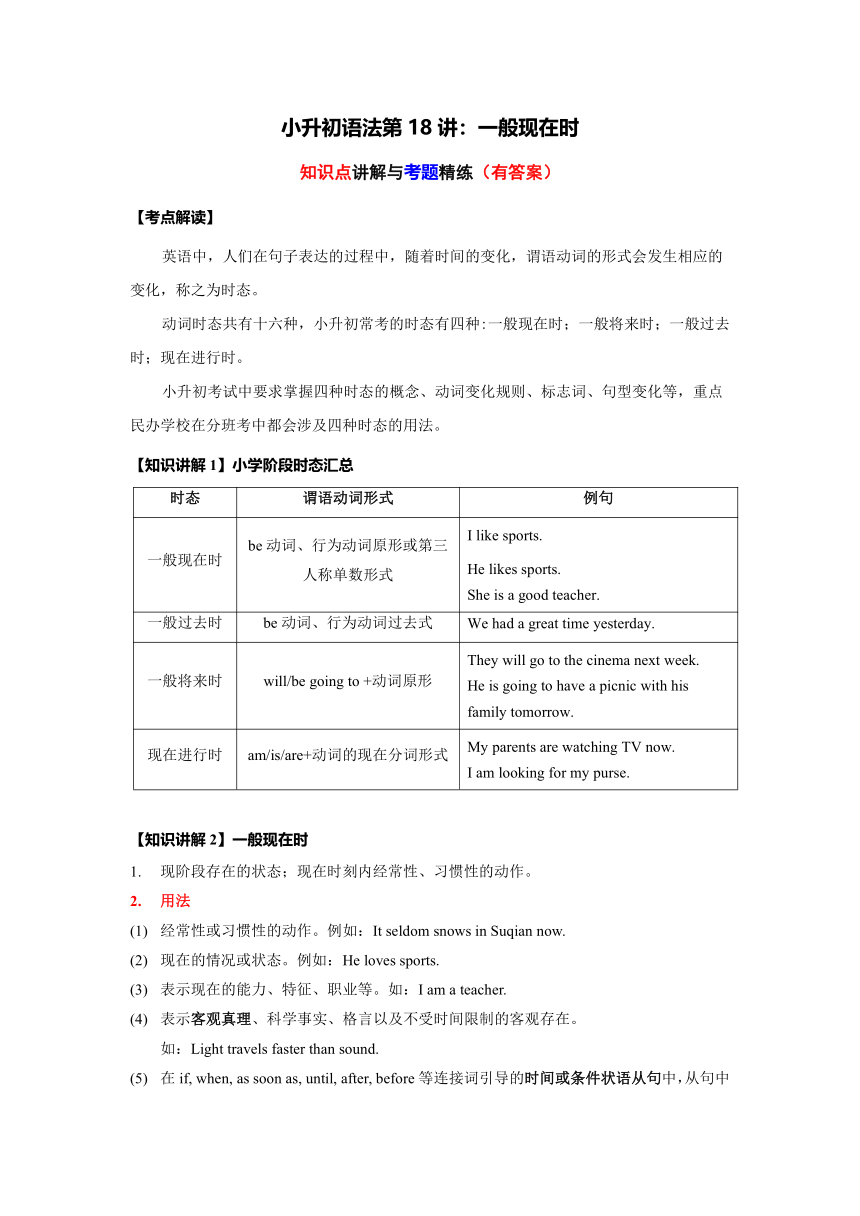 | |
| 格式 | doc | ||
| 文件大小 | 1.2MB | ||
| 资源类型 | 试卷 | ||
| 版本资源 | 通用版 | ||
| 科目 | 英语 | ||
| 更新时间 | 2022-12-02 10:54:54 | ||
图片预览

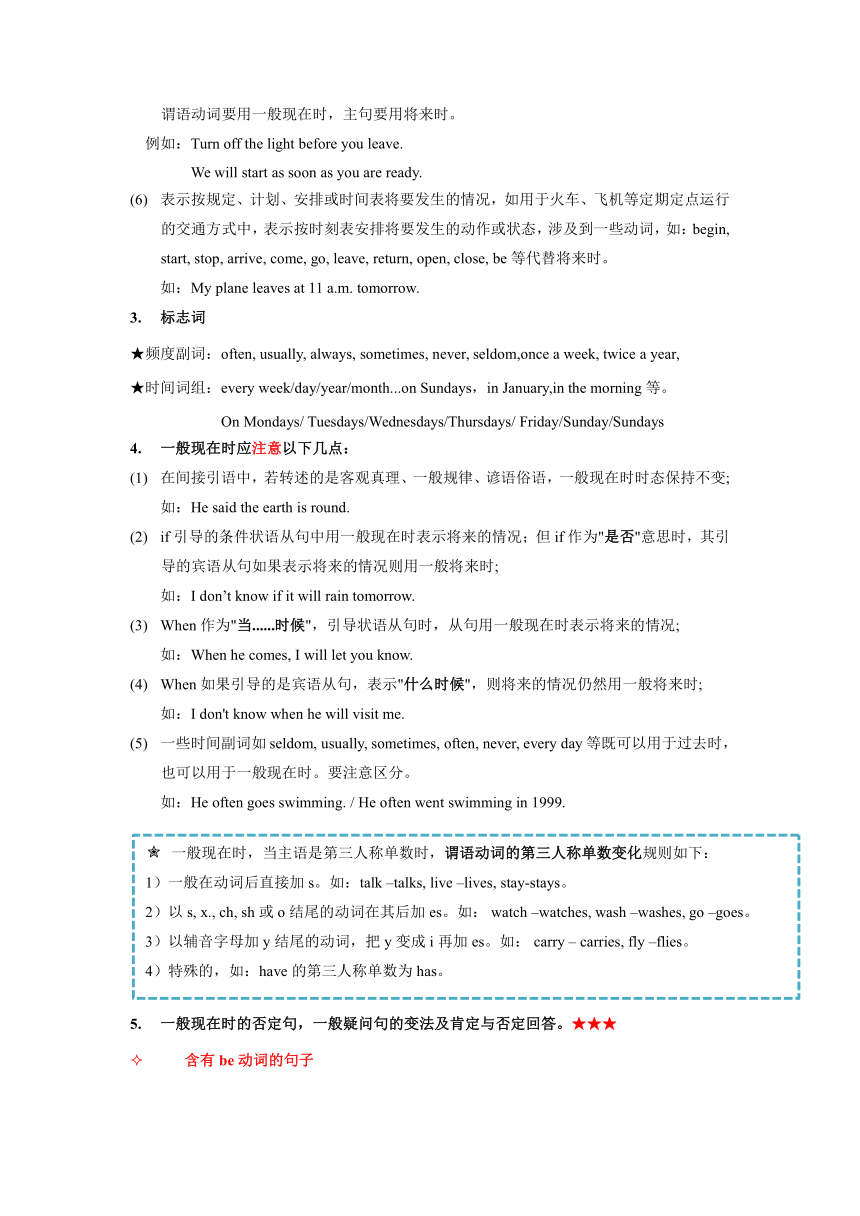
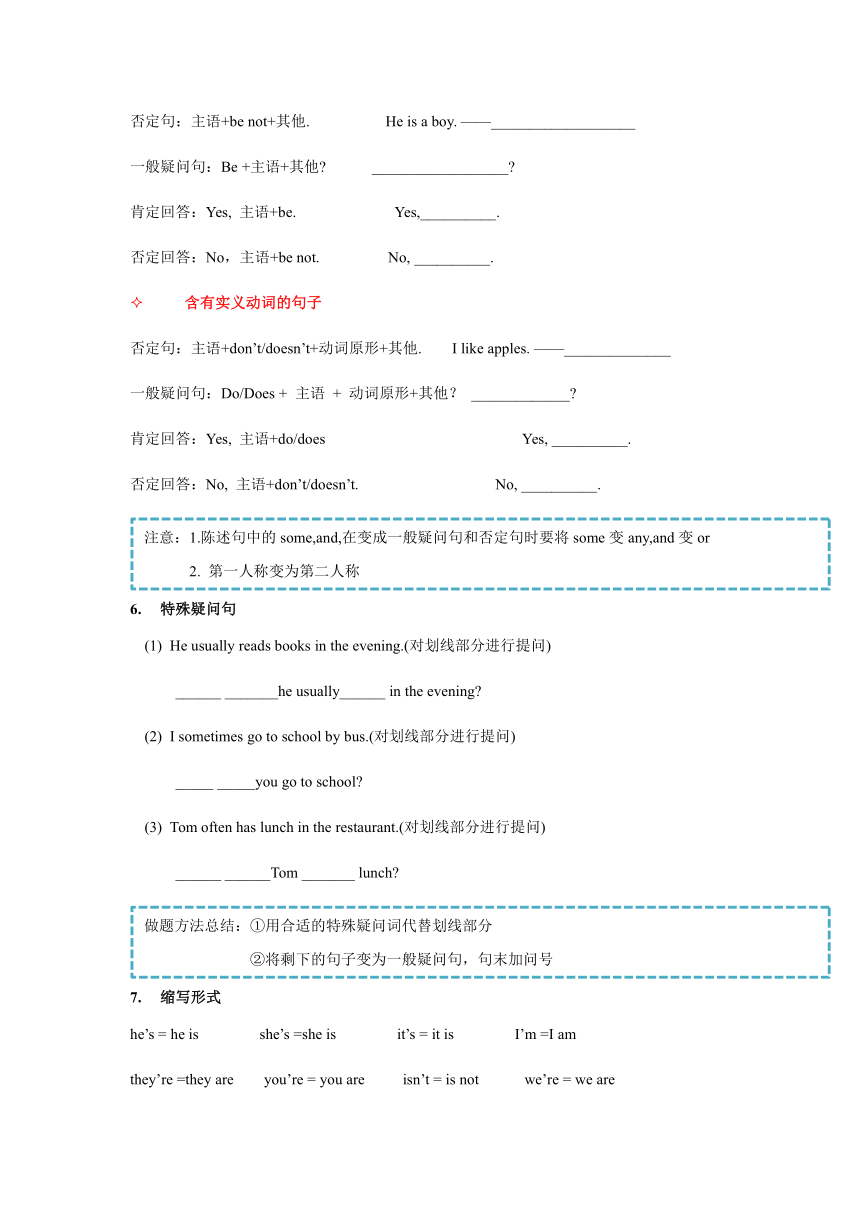
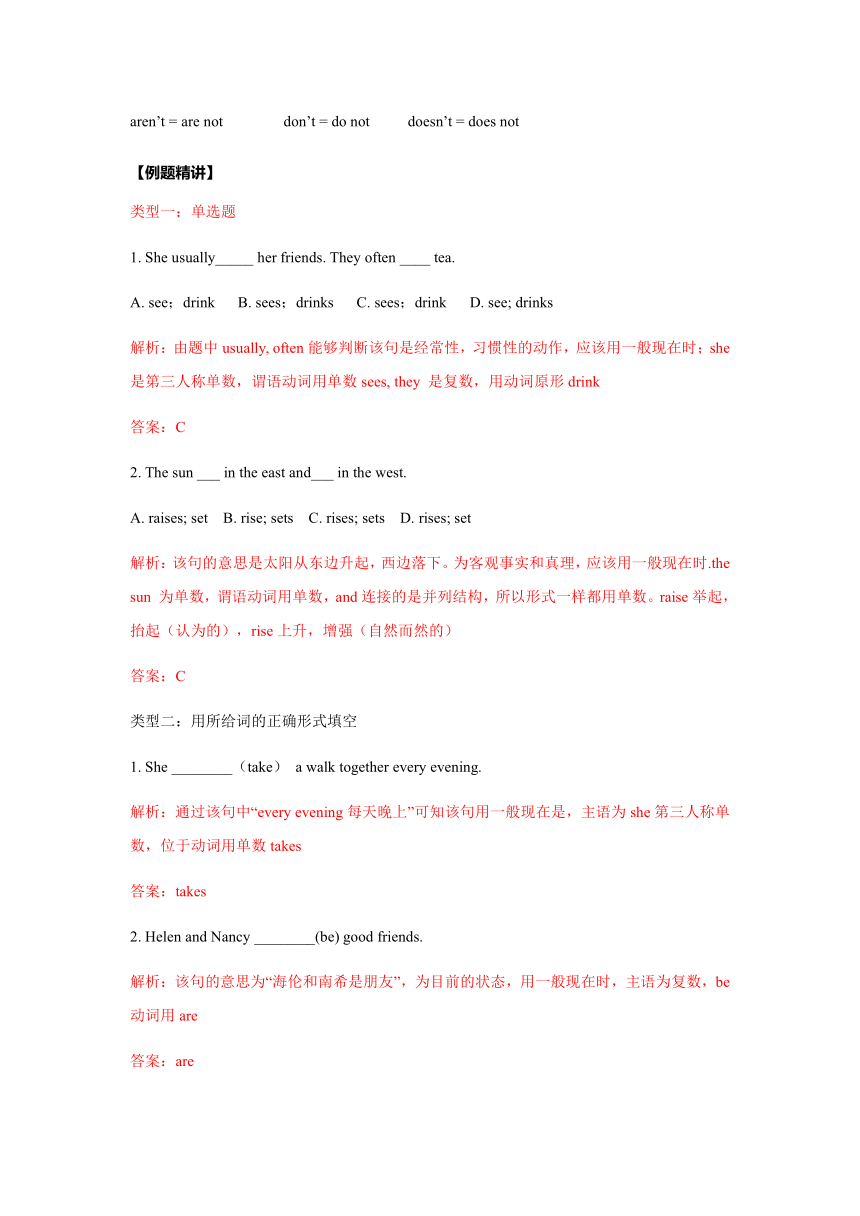
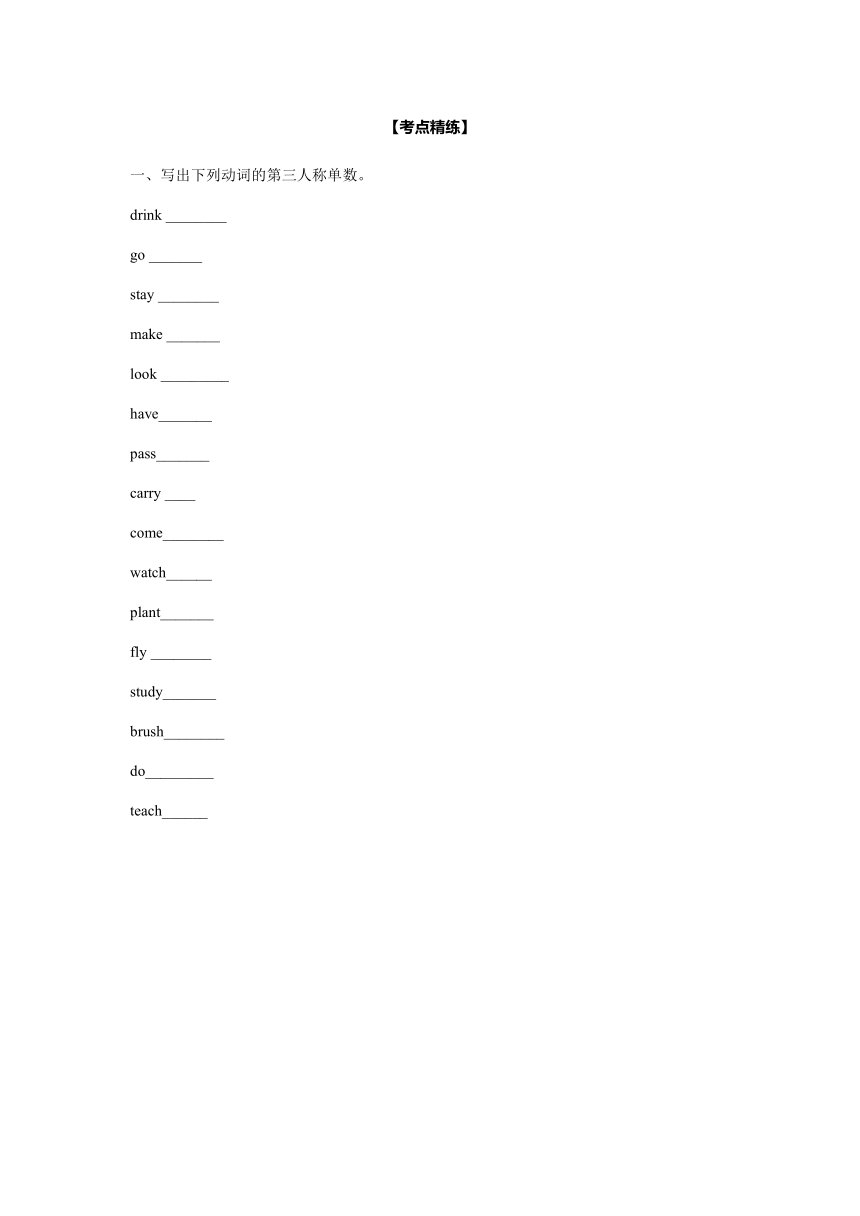
文档简介
小升初语法第18讲:一般现在时
知识点讲解与考题精练(有答案)
【考点解读】
英语中,人们在句子表达的过程中,随着时间的变化,谓语动词的形式会发生相应的变化,称之为时态。
动词时态共有十六种,小升初常考的时态有四种:一般现在时;一般将来时;一般过去时;现在进行时。
小升初考试中要求掌握四种时态的概念、动词变化规则、标志词、句型变化等,重点民办学校在分班考中都会涉及四种时态的用法。
【知识讲解1】小学阶段时态汇总
时态 谓语动词形式 例句
一般现在时 be动词、行为动词原形或第三人称单数形式 I like sports.He likes sports.She is a good teacher.
一般过去时 be动词、行为动词过去式 We had a great time yesterday.
一般将来时 will/be going to +动词原形 They will go to the cinema next week.He is going to have a picnic with his family tomorrow.
现在进行时 am/is/are+动词的现在分词形式 My parents are watching TV now.I am looking for my purse.
【知识讲解2】一般现在时
现阶段存在的状态;现在时刻内经常性、习惯性的动作。
用法
经常性或习惯性的动作。例如:It seldom snows in Suqian now.
现在的情况或状态。例如:He loves sports.
表示现在的能力、特征、职业等。如:I am a teacher.
表示客观真理、科学事实、格言以及不受时间限制的客观存在。
如:Light travels faster than sound.
在if, when, as soon as, until, after, before等连接词引导的时间或条件状语从句中,从句中谓语动词要用一般现在时,主句要用将来时。
例如:Turn off the light before you leave.
We will start as soon as you are ready.
表示按规定、计划、安排或时间表将要发生的情况,如用于火车、飞机等定期定点运行的交通方式中,表示按时刻表安排将要发生的动作或状态,涉及到一些动词,如:begin, start, stop, arrive, come, go, leave, return, open, close, be等代替将来时。
如:My plane leaves at 11 a.m. tomorrow.
标志词
★频度副词:often, usually, always, sometimes, never, seldom,once a week, twice a year,
★时间词组:every week/day/year/month...on Sundays,in January,in the morning等。
On Mondays/ Tuesdays/Wednesdays/Thursdays/ Friday/Sunday/Sundays
一般现在时应注意以下几点:
在间接引语中,若转述的是客观真理、一般规律、谚语俗语,一般现在时时态保持不变;
如:He said the earth is round.
if引导的条件状语从句中用一般现在时表示将来的情况;但if作为"是否"意思时,其引导的宾语从句如果表示将来的情况则用一般将来时;
如:I don’t know if it will rain tomorrow.
When作为"当......时候",引导状语从句时,从句用一般现在时表示将来的情况;
如:When he comes, I will let you know.
When如果引导的是宾语从句,表示"什么时候",则将来的情况仍然用一般将来时;
如:I don't know when he will visit me.
一些时间副词如seldom, usually, sometimes, often, never, every day等既可以用于过去时,也可以用于一般现在时。要注意区分。
如:He often goes swimming. / He often went swimming in 1999.
一般现在时的否定句,一般疑问句的变法及肯定与否定回答。★★★
含有be动词的句子
否定句:主语+be not+其他. He is a boy. ——___________________
一般疑问句:Be +主语+其他 __________________
肯定回答:Yes, 主语+be. Yes,__________.
否定回答:No,主语+be not. No, __________.
含有实义动词的句子
否定句:主语+don’t/doesn’t+动词原形+其他. I like apples. ——______________
一般疑问句:Do/Does + 主语 + 动词原形+其他? _____________
肯定回答:Yes, 主语+do/does Yes, __________.
否定回答:No, 主语+don’t/doesn’t. No, __________.
特殊疑问句
He usually reads books in the evening.(对划线部分进行提问)
______ _______he usually______ in the evening
I sometimes go to school by bus.(对划线部分进行提问)
_____ _____you go to school
Tom often has lunch in the restaurant.(对划线部分进行提问)
______ ______Tom _______ lunch
缩写形式
he’s = he is she’s =she is it’s = it is I’m =I am
they’re =they are you’re = you are isn’t = is not we’re = we are
aren’t = are not don’t = do not doesn’t = does not
【例题精讲】
类型一:单选题
1. She usually_____ her friends. They often ____ tea.
A. see;drink B. sees;drinks C. sees;drink D. see; drinks
解析:由题中usually, often能够判断该句是经常性,习惯性的动作,应该用一般现在时;she是第三人称单数,谓语动词用单数sees, they 是复数,用动词原形drink
答案:C
2. The sun ___ in the east and___ in the west.
A. raises; set B. rise; sets C. rises; sets D. rises; set
解析:该句的意思是太阳从东边升起,西边落下。为客观事实和真理,应该用一般现在时.the sun 为单数,谓语动词用单数,and连接的是并列结构,所以形式一样都用单数。raise举起,抬起(认为的),rise上升,增强(自然而然的)
答案:C
类型二:用所给词的正确形式填空
1. She ________(take) a walk together every evening.
解析:通过该句中“every evening每天晚上”可知该句用一般现在是,主语为she第三人称单数,位于动词用单数takes
答案:takes
2. Helen and Nancy ________(be) good friends.
解析:该句的意思为“海伦和南希是朋友”,为目前的状态,用一般现在时,主语为复数,be动词用are
答案:are
【考点精练】
写出下列动词的第三人称单数。
drink ________
go _______
stay ________
make _______
look _________
have_______
pass_______
carry ____
come________
watch______
plant_______
fly ________
study_______
brush________
do_________
teach______
用am, is, are 填空
1. I _____ a student.
2. You ____ a doctor.
3. ____she from Jinan
4. _____you American
5. It_____ a car.
6.They ____ cars.
7. ____ your mother in China
8._____your friends in New York
9. What ____her name
10. These _____ buses.
11. Those _____oranges.
12. Where _____ her mother
13. How old _____your teacher
14. What class _____ you in
按照要求改写句子
1. Daniel watches TV every evening. (改为否定句)
________________________________________________
2. I do my homework every day. (改为一般疑问句,作否定回答)
________________________________________________
3. She likes milk.(改为一般疑问句,作肯定回答)
________________________________________________
4. Amy likes playing computer games. (改为一般疑问句,作否定回答)
________________________________________________
5. We go to school every morning. (改为否定句)
________________________________________________
6. He speaks English very well. (改为否定句)
________________________________________________
7. He has some good friends.(变一般疑问句)
_________________________________________________
8. I like reading and swimming.( 变否定句)
_________________________________________________
单项选择。
( ) 1. _____ you have a book
A.Do B. Are C. Is D. Have
( )2. They _________ on a farm.
A. working B. is work C. work D. is worked
( ) 3. --Does Peter like to watch TV -- __________.
A.Yes, he like B. No, he doesn’t C. Yes, he’d like D. No, he likes
( )4. She doesn’t __________ her homework in the afternoon.
A. doing B. to do C. does D. do
( ) 5. How ____________ Mr. Brown ___________ to America
A.do, go B. is, go C. does, go D. does, goes
( )6. Where’s my camera I____________ it.
A. am not finding B. am not seeing C. can’t find D. can’t look at
( )7. --How ___________ he go to work --He ___________ to work by bike.
A.does go B. do; goes C. do go D. does; goes
( )8. Mr. Yang ____________ English this term(学期).
A. teaches our B. teaches us C. teachs us D. teach our
用所给词的正确形式填空
1. We often___________(play) on the playground.
2. Danny _______(study) English, Chinese, Math, Science and Art at school.
3. Mike sometimes __________ (go) to the park with his sister.
4. ________ Mike________ (read) English every day
5. There_______ (be) some water in the bottle.
6. What ______ your mother _______ (do) every evening She _______(wash) clothes.
7. _______ it ______ (rain) every day 8. What _______(do) you _______ on Sundays
We ________ (play) football.
9. There ________ (be) a football match on TV every morning.
10. They often ________ (visit) the Great Wall.
11. Who _______ (dance) the best in your class
12. The earth __________ (move) round the sun.
13. Mr. Wang often______( go) to Shanghai.
改句子
1. Do you often play football after school (肯定回答)__________________________________
2. I have many books. (改为否定句)_________________________________
3. Gao Shan’s sister likes playing table tennis (改为否定句)__________________________________
4. She lives in a small town near New York. (改为一般疑问句)___________________________________
5. I watch TV every day. (改为一般疑问句)_______________________________________
6. David has a goal. (改为一般疑问句)_______________________________________
7. We have four lessons.(否定句)_______________________________________
8. Nancy doesn’t run fast (肯定句)_______________________________________
9. My dog runs fast. (一般疑问句)_______________________________________
改错(划出错误的地方,将正确的写在横线上)
1. Is your brother speak English __________________
2. Does he likes going fishing __________________
3. He likes play games after class. __________________
4. Mr. Wu teachs us English. __________________
5. She don't do her homework on Sundays. _________________
根据短文内容用所给词的适当形式填空。
Mr. White (be) an English man. He teaches English. His English class is very interesting. He (like) us and we like him, too. Mr. White (have) two children—Tom and Lucy. Tom (be) seven and (he) sister Lucy is four. Tom (go) to school but Lucy (not go) to school. Mr. White likes to wear a T-shirt and jeans. Football is (he) favourite sport. After school we have a basketball match. Mr. White often (watch) and join us. He (play) basketball just for fun.
参考答案
一、drinks goes stays makes looks has passes carries comes watches plants flies studies brushes does teaches
二、
1. am 2. Are 3. Is 4. Are 5. is 6. are 7. Is 8. Are 9.is 10.are
11. are 12. Is 13. Is 14. Are
三、
1. Daniel doesn’t watch TV every evening.
2. Do you do your homework every day
3. Does she like milk
4. Does Amy like playing computer games
5. We don’t go to school every morning.
6. He doesn’t speak English very well.
7. Does he has any good friends
8. I don’t like reading and swimming.
四、1-8 ACBDCCD
五、1. play 2. studies 3. goes 4. Does, read 5.is 6. does, do, washes
7. Does, rain 8. do, do, play 9.is 10.visit 11. dances 12. moves 13. goes
六、1.Yes, I do. 2. I don’t have many books.
3. Gao Shan’s sister doesn’t like playing table tennis.
4. Does she live in a small town near New York.
5. Do you watch TV every day 6. Does David have a goal
7. We don’t have four lessons. 8. Nancy runs fast. 9. Does your dog run fast
七、1. Is-Does 2. likes-like 3. play-playing 4. teachs-teaches 5. don’t-doesn’t
八、Is, likes, has, is, his, goes, doesn’t go, his, watches, plays
一般现在时,当主语是第三人称单数时,谓语动词的第三人称单数变化规则如下:
1)一般在动词后直接加s。如:talk –talks, live –lives, stay-stays。
2)以s, x., ch, sh或o结尾的动词在其后加es。如: watch –watches, wash –washes, go –goes。
3)以辅音字母加y结尾的动词,把y变成i再加es。如: carry – carries, fly –flies。
4)特殊的,如:have的第三人称单数为has。
注意:1.陈述句中的some,and,在变成一般疑问句和否定句时要将some变any,and变or
2. 第一人称变为第二人称
做题方法总结:①用合适的特殊疑问词代替划线部分
②将剩下的句子变为一般疑问句,句末加问号
知识点讲解与考题精练(有答案)
【考点解读】
英语中,人们在句子表达的过程中,随着时间的变化,谓语动词的形式会发生相应的变化,称之为时态。
动词时态共有十六种,小升初常考的时态有四种:一般现在时;一般将来时;一般过去时;现在进行时。
小升初考试中要求掌握四种时态的概念、动词变化规则、标志词、句型变化等,重点民办学校在分班考中都会涉及四种时态的用法。
【知识讲解1】小学阶段时态汇总
时态 谓语动词形式 例句
一般现在时 be动词、行为动词原形或第三人称单数形式 I like sports.He likes sports.She is a good teacher.
一般过去时 be动词、行为动词过去式 We had a great time yesterday.
一般将来时 will/be going to +动词原形 They will go to the cinema next week.He is going to have a picnic with his family tomorrow.
现在进行时 am/is/are+动词的现在分词形式 My parents are watching TV now.I am looking for my purse.
【知识讲解2】一般现在时
现阶段存在的状态;现在时刻内经常性、习惯性的动作。
用法
经常性或习惯性的动作。例如:It seldom snows in Suqian now.
现在的情况或状态。例如:He loves sports.
表示现在的能力、特征、职业等。如:I am a teacher.
表示客观真理、科学事实、格言以及不受时间限制的客观存在。
如:Light travels faster than sound.
在if, when, as soon as, until, after, before等连接词引导的时间或条件状语从句中,从句中谓语动词要用一般现在时,主句要用将来时。
例如:Turn off the light before you leave.
We will start as soon as you are ready.
表示按规定、计划、安排或时间表将要发生的情况,如用于火车、飞机等定期定点运行的交通方式中,表示按时刻表安排将要发生的动作或状态,涉及到一些动词,如:begin, start, stop, arrive, come, go, leave, return, open, close, be等代替将来时。
如:My plane leaves at 11 a.m. tomorrow.
标志词
★频度副词:often, usually, always, sometimes, never, seldom,once a week, twice a year,
★时间词组:every week/day/year/month...on Sundays,in January,in the morning等。
On Mondays/ Tuesdays/Wednesdays/Thursdays/ Friday/Sunday/Sundays
一般现在时应注意以下几点:
在间接引语中,若转述的是客观真理、一般规律、谚语俗语,一般现在时时态保持不变;
如:He said the earth is round.
if引导的条件状语从句中用一般现在时表示将来的情况;但if作为"是否"意思时,其引导的宾语从句如果表示将来的情况则用一般将来时;
如:I don’t know if it will rain tomorrow.
When作为"当......时候",引导状语从句时,从句用一般现在时表示将来的情况;
如:When he comes, I will let you know.
When如果引导的是宾语从句,表示"什么时候",则将来的情况仍然用一般将来时;
如:I don't know when he will visit me.
一些时间副词如seldom, usually, sometimes, often, never, every day等既可以用于过去时,也可以用于一般现在时。要注意区分。
如:He often goes swimming. / He often went swimming in 1999.
一般现在时的否定句,一般疑问句的变法及肯定与否定回答。★★★
含有be动词的句子
否定句:主语+be not+其他. He is a boy. ——___________________
一般疑问句:Be +主语+其他 __________________
肯定回答:Yes, 主语+be. Yes,__________.
否定回答:No,主语+be not. No, __________.
含有实义动词的句子
否定句:主语+don’t/doesn’t+动词原形+其他. I like apples. ——______________
一般疑问句:Do/Does + 主语 + 动词原形+其他? _____________
肯定回答:Yes, 主语+do/does Yes, __________.
否定回答:No, 主语+don’t/doesn’t. No, __________.
特殊疑问句
He usually reads books in the evening.(对划线部分进行提问)
______ _______he usually______ in the evening
I sometimes go to school by bus.(对划线部分进行提问)
_____ _____you go to school
Tom often has lunch in the restaurant.(对划线部分进行提问)
______ ______Tom _______ lunch
缩写形式
he’s = he is she’s =she is it’s = it is I’m =I am
they’re =they are you’re = you are isn’t = is not we’re = we are
aren’t = are not don’t = do not doesn’t = does not
【例题精讲】
类型一:单选题
1. She usually_____ her friends. They often ____ tea.
A. see;drink B. sees;drinks C. sees;drink D. see; drinks
解析:由题中usually, often能够判断该句是经常性,习惯性的动作,应该用一般现在时;she是第三人称单数,谓语动词用单数sees, they 是复数,用动词原形drink
答案:C
2. The sun ___ in the east and___ in the west.
A. raises; set B. rise; sets C. rises; sets D. rises; set
解析:该句的意思是太阳从东边升起,西边落下。为客观事实和真理,应该用一般现在时.the sun 为单数,谓语动词用单数,and连接的是并列结构,所以形式一样都用单数。raise举起,抬起(认为的),rise上升,增强(自然而然的)
答案:C
类型二:用所给词的正确形式填空
1. She ________(take) a walk together every evening.
解析:通过该句中“every evening每天晚上”可知该句用一般现在是,主语为she第三人称单数,位于动词用单数takes
答案:takes
2. Helen and Nancy ________(be) good friends.
解析:该句的意思为“海伦和南希是朋友”,为目前的状态,用一般现在时,主语为复数,be动词用are
答案:are
【考点精练】
写出下列动词的第三人称单数。
drink ________
go _______
stay ________
make _______
look _________
have_______
pass_______
carry ____
come________
watch______
plant_______
fly ________
study_______
brush________
do_________
teach______
用am, is, are 填空
1. I _____ a student.
2. You ____ a doctor.
3. ____she from Jinan
4. _____you American
5. It_____ a car.
6.They ____ cars.
7. ____ your mother in China
8._____your friends in New York
9. What ____her name
10. These _____ buses.
11. Those _____oranges.
12. Where _____ her mother
13. How old _____your teacher
14. What class _____ you in
按照要求改写句子
1. Daniel watches TV every evening. (改为否定句)
________________________________________________
2. I do my homework every day. (改为一般疑问句,作否定回答)
________________________________________________
3. She likes milk.(改为一般疑问句,作肯定回答)
________________________________________________
4. Amy likes playing computer games. (改为一般疑问句,作否定回答)
________________________________________________
5. We go to school every morning. (改为否定句)
________________________________________________
6. He speaks English very well. (改为否定句)
________________________________________________
7. He has some good friends.(变一般疑问句)
_________________________________________________
8. I like reading and swimming.( 变否定句)
_________________________________________________
单项选择。
( ) 1. _____ you have a book
A.Do B. Are C. Is D. Have
( )2. They _________ on a farm.
A. working B. is work C. work D. is worked
( ) 3. --Does Peter like to watch TV -- __________.
A.Yes, he like B. No, he doesn’t C. Yes, he’d like D. No, he likes
( )4. She doesn’t __________ her homework in the afternoon.
A. doing B. to do C. does D. do
( ) 5. How ____________ Mr. Brown ___________ to America
A.do, go B. is, go C. does, go D. does, goes
( )6. Where’s my camera I____________ it.
A. am not finding B. am not seeing C. can’t find D. can’t look at
( )7. --How ___________ he go to work --He ___________ to work by bike.
A.does go B. do; goes C. do go D. does; goes
( )8. Mr. Yang ____________ English this term(学期).
A. teaches our B. teaches us C. teachs us D. teach our
用所给词的正确形式填空
1. We often___________(play) on the playground.
2. Danny _______(study) English, Chinese, Math, Science and Art at school.
3. Mike sometimes __________ (go) to the park with his sister.
4. ________ Mike________ (read) English every day
5. There_______ (be) some water in the bottle.
6. What ______ your mother _______ (do) every evening She _______(wash) clothes.
7. _______ it ______ (rain) every day 8. What _______(do) you _______ on Sundays
We ________ (play) football.
9. There ________ (be) a football match on TV every morning.
10. They often ________ (visit) the Great Wall.
11. Who _______ (dance) the best in your class
12. The earth __________ (move) round the sun.
13. Mr. Wang often______( go) to Shanghai.
改句子
1. Do you often play football after school (肯定回答)__________________________________
2. I have many books. (改为否定句)_________________________________
3. Gao Shan’s sister likes playing table tennis (改为否定句)__________________________________
4. She lives in a small town near New York. (改为一般疑问句)___________________________________
5. I watch TV every day. (改为一般疑问句)_______________________________________
6. David has a goal. (改为一般疑问句)_______________________________________
7. We have four lessons.(否定句)_______________________________________
8. Nancy doesn’t run fast (肯定句)_______________________________________
9. My dog runs fast. (一般疑问句)_______________________________________
改错(划出错误的地方,将正确的写在横线上)
1. Is your brother speak English __________________
2. Does he likes going fishing __________________
3. He likes play games after class. __________________
4. Mr. Wu teachs us English. __________________
5. She don't do her homework on Sundays. _________________
根据短文内容用所给词的适当形式填空。
Mr. White (be) an English man. He teaches English. His English class is very interesting. He (like) us and we like him, too. Mr. White (have) two children—Tom and Lucy. Tom (be) seven and (he) sister Lucy is four. Tom (go) to school but Lucy (not go) to school. Mr. White likes to wear a T-shirt and jeans. Football is (he) favourite sport. After school we have a basketball match. Mr. White often (watch) and join us. He (play) basketball just for fun.
参考答案
一、drinks goes stays makes looks has passes carries comes watches plants flies studies brushes does teaches
二、
1. am 2. Are 3. Is 4. Are 5. is 6. are 7. Is 8. Are 9.is 10.are
11. are 12. Is 13. Is 14. Are
三、
1. Daniel doesn’t watch TV every evening.
2. Do you do your homework every day
3. Does she like milk
4. Does Amy like playing computer games
5. We don’t go to school every morning.
6. He doesn’t speak English very well.
7. Does he has any good friends
8. I don’t like reading and swimming.
四、1-8 ACBDCCD
五、1. play 2. studies 3. goes 4. Does, read 5.is 6. does, do, washes
7. Does, rain 8. do, do, play 9.is 10.visit 11. dances 12. moves 13. goes
六、1.Yes, I do. 2. I don’t have many books.
3. Gao Shan’s sister doesn’t like playing table tennis.
4. Does she live in a small town near New York.
5. Do you watch TV every day 6. Does David have a goal
7. We don’t have four lessons. 8. Nancy runs fast. 9. Does your dog run fast
七、1. Is-Does 2. likes-like 3. play-playing 4. teachs-teaches 5. don’t-doesn’t
八、Is, likes, has, is, his, goes, doesn’t go, his, watches, plays
一般现在时,当主语是第三人称单数时,谓语动词的第三人称单数变化规则如下:
1)一般在动词后直接加s。如:talk –talks, live –lives, stay-stays。
2)以s, x., ch, sh或o结尾的动词在其后加es。如: watch –watches, wash –washes, go –goes。
3)以辅音字母加y结尾的动词,把y变成i再加es。如: carry – carries, fly –flies。
4)特殊的,如:have的第三人称单数为has。
注意:1.陈述句中的some,and,在变成一般疑问句和否定句时要将some变any,and变or
2. 第一人称变为第二人称
做题方法总结:①用合适的特殊疑问词代替划线部分
②将剩下的句子变为一般疑问句,句末加问号
